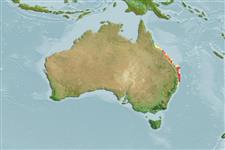Teleostei (teleosts) >
Perciformes/Scorpaenoidei (Scorpionfishes) >
Aploactinidae (Velvetfishes)
Etymology: Cocotropus: Greek, kokkos = berry, seed + Greek, tropsis, tropo = turning (Ref. 45335); microps: Name referrong to the small, inconspicuous eyes.
Environment: milieu / climate zone / depth range / distribution range
Ecology
Marine; benthopelagic; depth range 0 - 14 m (Ref. 57897). Subtropical
Southwest Pacific: eastern Australia.
Size / Weight / Age
Maturity: Lm ? range ? - ? cm
Max length : 3.9 cm SL male/unsexed; (Ref. 57897)
Dorsal spines (total): 12; Dorsal soft rays (total): 7; Anal spines: 2; Anal soft rays: 5; Vertebrae: 24. This species is characterized by the following: Dorsal XII, 7; anal II, 5; pectoral 10-11; pelvic I, 3; caudal 16-17; with all fin rays unbranched; vertebrae 24. Dorsal fin with anterior, middle and posterior portions notably elevated, first interspace moderately scalloped, second deeply notched; the dorsal membrane is connected posteriorly to the caudal peduncle; head, body and fins densely covered with scales, modified to form velvety prickles; a small fleshy extension on the anterior of the isthmus; frontal ridges parallel on interorbital; body and fins variously marked with pale or white blotches, or small irregular spots (Ref. 57897).
Collected among rocky substrate or rocky reef with some coral growth (Ref. 57897).
Life cycle and mating behavior
Maturity | Reproduction | Spawning | Eggs | Fecundity | Larvae
Johnson, J.W., 2004. Two new species and two new records of aploactinid fishes (Pisces: Scorpaeniformes) from Australia. Rec. Aust. Mus. 56(2):179-188. (Ref. 57897)
IUCN Red List Status (Ref. 130435: Version 2024-2)
Threat to humans
Harmless
Human uses
Tools
Special reports
Download XML
Internet sources
Estimates based on models
Preferred temperature (Ref.
123201): 24.5 - 27.1, mean 25.8 °C (based on 218 cells).
Phylogenetic diversity index (Ref.
82804): PD
50 = 0.5000 [Uniqueness, from 0.5 = low to 2.0 = high].
Bayesian length-weight: a=0.01122 (0.00514 - 0.02450), b=3.04 (2.87 - 3.21), in cm total length, based on all LWR estimates for this body shape (Ref.
93245).
Trophic level (Ref.
69278): 3.2 ±0.3 se; based on size and trophs of closest relatives
Fishing Vulnerability (Ref.
59153): Low vulnerability (10 of 100).
